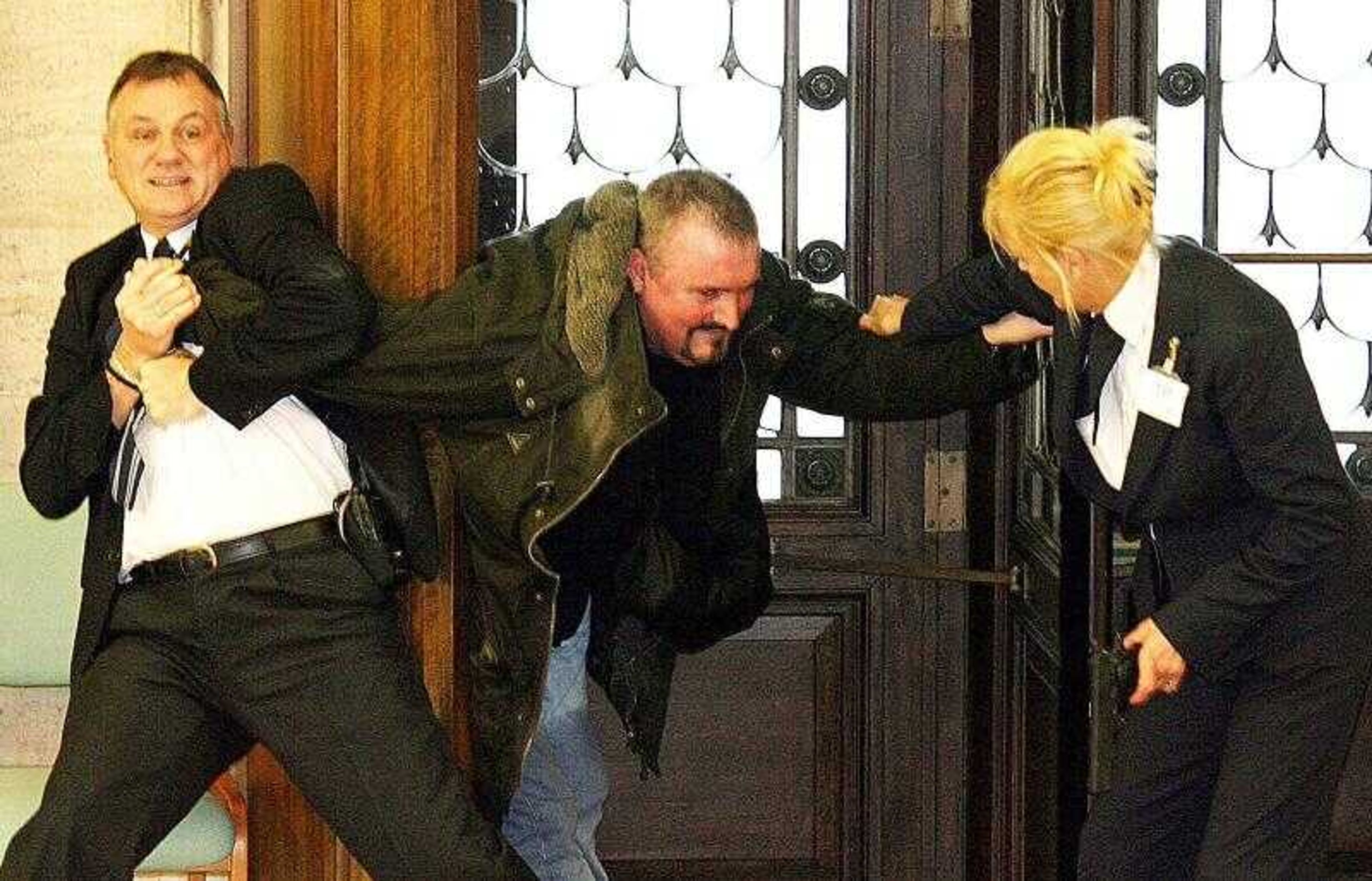Bomb-toting Protestant icon disrupts N. Ireland politicians
BELFAST, Northern Ireland -- Belfast's most infamous militant stormed into the Northern Ireland Assembly headquarters Friday with a bagful of pipe bombs, forcing an evacuation that overshadowed the politicians' failure to meet a deadline for forming a new Catholic-Protestant administration...
BELFAST, Northern Ireland -- Belfast's most infamous militant stormed into the Northern Ireland Assembly headquarters Friday with a bagful of pipe bombs, forcing an evacuation that overshadowed the politicians' failure to meet a deadline for forming a new Catholic-Protestant administration.
Two security guards trapped Michael Stone -- an icon of Protestant extremism because of his grenade-and-gun attack on an Irish Republican Army funeral in 1988 -- halfway inside the brass revolving door of Stormont Parliamentary Building.
Stone, a long-feared figure who boasts of his desire to kill Sinn Fein leaders, repeatedly screamed "No surrender!" as one guard twisted Stone's arm and another pulled a handgun from his jacket.
British army experts using remote-controlled robots later discovered at least six working pipe bombs inside a bag he was carrying, police said.
"Today could be a defining moment, not least because a serious attempt to kill and injure people in this parliament building was only averted by the bravery of staff members. Now we need to match that bravery," said Sinn Fein leader Gerry Adams, whose IRA-linked party represents most of the Catholic minority in Northern Ireland.
Stone's thwarted attack came on the day when a Catholic-Protestant administration, the central aim of the Good Friday peace accord of 1998, was supposed to be resurrected after four years of deadlock.
The British and Irish prime ministers, Tony Blair and Bertie Ahern, spent months insisting that Friday would be their final, non-negotiable deadline for the major Protestant party, the Democratic Unionists, to forge a coalition with their Sinn Fein enemies. The premiers reluctantly retreated from that ultimatum by saying that only the top two positions in the envisioned 12-member Cabinet must be filled by the deadline.
But the Democratic Unionist leader, Ian Paisley, an 80-year-old evangelist who has been a bulwark against compromise with Catholics throughout the four-decade conflict over this British territory, told the Northern Ireland Assembly that the time was not yet right for him to take the top post of first minister. Paisley, repeating a months-old position, said he would cooperate only after Sinn Fein formally recognized the authority of the police force in Northern Ireland.
"Clearly, as Sinn Fein is not yet ready to take the decisive step forward on policing, the Democratic Unionist Party is not required to commit to any aspect of power-sharing in advance of such certainty. The circumstances have not been reached where there can be a nomination or a designation this day," Paisley said as Adams sat stone-faced across the chamber.
Underlying his desperation to sustain another round of negotiations, Blair welcomed Paisley's words as offering hope of an eventual breakthrough before another batch of supposed deadlines. Blair has planned a new Assembly election March 7, and hopes its members will elect the full administration a week later. Britain would hand it control of 13 Northern Ireland departments on March 26.
Blair's government minister for Northern Ireland, Peter Hain, provoked guffaws of disbelief in the Assembly when he declared, in a statement issued through Speaker Eileen Bell, that he considered Paisley's refusal to accept office as a sufficient "indication" that he eventually would.
The Catholic and Protestant moderate leaders who led Northern Ireland's failed 1999-2002 power-sharing administration decried Britain's position as implausible.
Sinn Fein and the Democratic Unionists, who hold the power to form an administration today because they defeated the moderates in a 2003 election, offered little criticism.
"There is as much hollow farce as historic significance in what we have witnessed this morning," said Mark Durkan, whose Social Democratic and Labour Party represents moderate Catholic opinion. He said Hain had turned "language and logic inside out and on its head."
As politicians sought to press Paisley about his position, the fire alarms sounded and a security guard burst into the chamber to tell Bell about the bomb threat.
The speaker told everyone they must shut up and leave at once -- "unless you want to sit here and be bombed," she quipped.
Guards gruffly shepherded politicians, journalists and civil servants outside Stormont Parliamentary Building into an icy rainstorm, where they could watch other guards wrestling Stone to the steps of the marble-columned edifice.
Stone also had tried to scrawl a political protest in red spraypaint on the wall, but journalists were divided about whether his half-finished slogan was meant to say "Sinn Fein IRA murderers" or "war criminals."
Hours later, police commander Hugh Orde stunned Northern Ireland by announcing that it wasn't just a stunt: Stone's bag contained six to eight pipe bombs, although he couldn't confirm whether the handgun was in working order.
Stone was responsible for one of Northern Ireland's most horrific and audacious attacks: a March 16, 1988, gun-and-grenade strike on an IRA funeral. He killed three mourners, among them an IRA man, and wounded about 60 until a pursuing Catholic mob surrounded and beat him before police intervened.
Protestant hard-liners lauded him with Belfast wall murals, one of which gloated: "We killed three with one Stone." In a February 1992 jailhouse interview with The Associated Press, Stone said he had only two regrets: He should have got nearer to Sinn Fein leaders before opening fire, and he timed his grenade-tossing poorly. They detonated in the cemetery's long grass, not in midair, where the shrapnel would have caused far more bloodshed.
Stone was paroled from prison in 2000 as part of the Good Friday deal, which permitted early releases for more than 500 convicted members of the IRA and Protestant paramilitary groups.
Connect with the Southeast Missourian Newsroom:
For corrections to this story or other insights for the editor, click here. To submit a letter to the editor, click here. To learn about the Southeast Missourian’s AI Policy, click here.










